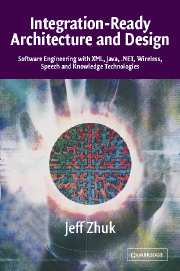 Integration-Ready Architecture and Design
Integration-Ready Architecture and Design Published online by Cambridge University Press: 17 August 2009
Knowledge is power. (Ipsa Scientia Potestas Est)
—Sir Francis Bacon (1561–1626), MeditationsOntology is a controlled, hierarchical vocabulary for describing a knowledge system or knowledge-handling methods.
This chapter is an introduction to a development paradigm in which software and knowledge engineering are integrated. As always happens on the other side of an economic crisis, a new set of skills will be required. A growing number of developers will actively use the knowledge technologies reviewed in this chapter.
The chapter starts by talking about fundamental standards that currently bridge ontology and engineering: the Resource Description Framework (RDF), the Semantic Web language DAML+OIL (DARPA Agent Markup Language + Ontology Inference Layer), Topic Maps concepts, and their XML Topic Maps (XTM) standard knowledge exchange format.
We'll continue with a brief overview of data-mining methods with coming Java support and eventually discuss the challenging topic of generic knowledge, not just knowledge of a specific business domain, expressed in natural language. The final part of the chapter describes OpenCyc, probably the most exciting knowledge instrument today, and provides examples of using the CycL language and OpenCyc engine in distributed knowledge systems.
I hope this chapter does not take you, my reader, by surprise. Integration-ready systems and collaborative engineering need and help create knowledge technologies, which create a very healthy cycle.
A customer with a computer and computer skills is still the main target for computerized services today.
Even when searching Google.com for a specific topic, you need to know the specific terms of the industry this topic belongs to.
To save this book to your Kindle, first ensure [email protected] is added to your Approved Personal Document E-mail List under your Personal Document Settings on the Manage Your Content and Devices page of your Amazon account. Then enter the ‘name’ part of your Kindle email address below. Find out more about saving to your Kindle.
Note you can select to save to either the @free.kindle.com or @kindle.com variations. ‘@free.kindle.com’ emails are free but can only be saved to your device when it is connected to wi-fi. ‘@kindle.com’ emails can be delivered even when you are not connected to wi-fi, but note that service fees apply.
Find out more about the Kindle Personal Document Service.
To save content items to your account, please confirm that you agree to abide by our usage policies. If this is the first time you use this feature, you will be asked to authorise Cambridge Core to connect with your account. Find out more about saving content to Dropbox.
To save content items to your account, please confirm that you agree to abide by our usage policies. If this is the first time you use this feature, you will be asked to authorise Cambridge Core to connect with your account. Find out more about saving content to Google Drive.